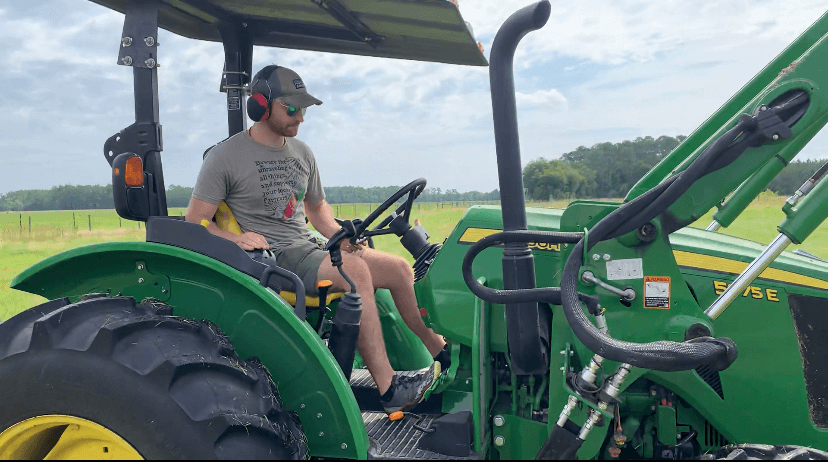Dr. Chris Wilson
Associate Professor, Forages
Global Change Agroecologist
Program Areas
As an agroecologist, Dr. Wilson brings the concepts, methods, and data from ecological science to the design, management, and study of agricultural systems, including annual crops and pasture. Overall, his research team is tackling three broad research areas: 1) how to monitor agroecosystem productivity and contribution to ecosystem services using data from satellite remote sensing platforms, hyperspectral sensors, ecosystem models and Bayesian inference; 2) studying how pasture management - including plant composition and diversity, nutrient application and grazing – impacts productivity, belowground carbon allocation, and soil carbon sequestration services; and 3) investigating how exposure to abiotic stressors like drought can impact crop physiology and plant defenses, with the goal of designing more resilient crop production systems.
As an educator, he is passionate about teaching agroecology as a comprehensive, interdisciplinary science for understanding and improving our agricultural and food systems, at both the undergraduate and graduate levels.

Contact Information
352-273-2217
Office:
Main Campus
2089 McCarty Hall B
Gainesville, FL 32611
Mailing Address:
Main Campus
PO Box 110500
2089 McCarty Hall B
Gainesville, FL 32611
-
Teaching
I have developed and offer several courses every year, in which my primary goal is to teach the fundamentals of agroecology as a rigorous, interdisciplinary science at both the undergraduate and graduate levels. For undergraduates, my primary offering is Alternative Crop Systems (AGR 4212) offered every Spring, both in person and since 2021 in a fully asynchronous online format as well. In AGR 4212, we analyze a variety of conventional and alternative crop systems, with a particular emphasis on local, regional, and national trends, and a strong focus on staple food crop systems including traditional row crops, forages and emerging perennial crops for feed, fuel, and fiber. We analyze the adoption of new systems or practices intended to enhance sustainability in a comparative manner, with reference to a foundation in the methods of conventional agriculture and relevant portions of plant and soil science developed early in the semester. Through field trips, case studies, and synthetic assignments, students are challenged to bridge from the general to the particular, and to consider how positive change, whether incremental or transformational, requires application of sound biophysical principles as well as appreciation of the central role of human dimensions.
For graduate students, I teach and co-teach two courses: Global Agroecosystems (ALS 5155) with Gabriel Maltais-Landry (in SWS), and Crop Ecology (AGR 5511). ALS 5155, offered every Fall, serves as the foundational course for our graduate concentration in Global Systems Agroecology. Our approach is to develop a broad, comprehensive awareness of global sustainability challenges facing agricultural systems, and to introduce students to rigorous, nuanced analysis of agricultural solutions using the framework of the Three Pillars, in which agroecosystems are simultaneously assessed from productivity, environmental and social perspectives. Global case studies are emphasized, particularly those exemplifying agroecological approaches to addressing food security and global change challenges. Additionally, we bring in a variety of guest lectures from across UF and our partner institutions in agroecology, to ensure students are exposed to a broad range of information and perspectives. AGR 5511, offered online every Fall, provides an in-depth treatment of crop-environment interactions. Foundational, quantitative approaches are emphasized, enabling students to link variations in abiotic and biotic environments to the productivity and sustainability of crop systems. Overall, this course is intended to serve as a bridge between the perspectives of crop physiology, ecosystem ecology and crop modeling.
In addition to my primary courses, I also helped develop and continue to periodically co-teach our novel project-focused courses called Project Team Research: Building Skills in Agrobiology (ALS 6031), which pair a small team of graduate students with a stakeholder sponsor who bring a specific, applied problem for the students to work on over the semester. These non-traditional courses provide an invaluable experience in team-based work, allowing students to develop critical skills in communication, organization, and leadership. In Fall 2019, I ran a successful pilot of a class called “Hierarchical Bayesian Models for the Agricultural Sciences in Stan”, in which I taught the fundamentals of Bayesian hierarchical models as applied to scientific, process-based models using a state-of-the-art probabilistic programming language called Stan.
Finally, I enjoy contributing both formally and informally to graduate student education in the form of mentorship. I currently supervise 4 graduate students (3 PhD, 1 MS), and serve on 6 other graduate student committees.
-
Research
My central motivation as a scientist is to contribute toward a future of greater agricultural sustainability in a world undergoing tremendous changes at all scales, from local to global. As an agroecologist, I bring the concepts, methods, and data from ecological science to the design, management, and study of agricultural systems, including annual crops and pasture. I also bring background in smaller-scale farming – as well as training in agronomy - to this endeavor, and thus remain very sensitive to the perspectives and needs of diverse groups of producers in our wider science of agricultural sustainability. Overall, my research group is tackling three broad research areas: 1) how to monitor agroecosystem productivity and contribution to ecosystem services using data from satellite remote sensing platforms, hyperspectral sensors, ecosystem models and Bayesian inference; 2) studying how pasture management - including plant composition and diversity, nutrient application and grazing – impacts productivity, belowground carbon allocation, and soil carbon sequestration services; and 3) investigating how exposure to abiotic stressors like drought can impact crop physiology and plant defenses, with the goal of designing more resilient crop production systems.
- Links
-
Gallery Video
